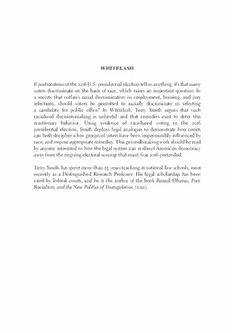
Whitelash: Unmasking White Grievance at the Ballot Box PDF
Preview Whitelash: Unmasking White Grievance at the Ballot Box
whitelash Ifpostmortemsofthe2016U.S.presidentialelectiontellusanything,it’sthatmany voters discriminate on the basis of race, which raises an important question: In a society that outlaws racial discrimination in employment, housing, and jury selections, should voters be permitted to racially discriminate in selecting a candidate for public office? In Whitelash, Terry Smith argues that such racialized decision-making is unlawful and that remedies exist to deter this reactionary behavior. Using evidence of race-based voting in the 2016 presidential election, Smith deploys legal analogies to demonstrate how courts canbothdecipherwhengroupsofvotershavebeenimpermissiblyinfluencedby race,andimposeappropriateremedies.Thisgroundbreakingworkshouldberead byanyoneinterestedinhowthelegalsystemcanre-directAmericandemocracy awayfromtheongoingelectoralscourgethatmanyfear2016portended. TerrySmithhasspentmorethan25yearsteachingatnationallawschools,most recently as a Distinguished Research Professor. His legal scholarship has been cited by federal courts, and he is the author of the book Barack Obama, Post- Racialism,andtheNewPoliticsofTriangulation(2012). Downloaded from https://www.cambridge.org/core. IP address: 77.137.91.101, on 11 Jul 2020 at 21:02:49, subject to the Cambridge Core terms of use, available at https://www.cambridge.org/core/terms. https://doi.org/10.1017/9781108698412 Downloaded from https://www.cambridge.org/core. IP address: 77.137.91.101, on 11 Jul 2020 at 21:02:49, subject to the Cambridge Core terms of use, available at https://www.cambridge.org/core/terms. https://doi.org/10.1017/9781108698412 Whitelash unmasking white grievance at the ballot box TERRY SMITH Downloaded from https://www.cambridge.org/core. IP address: 77.137.91.101, on 11 Jul 2020 at 21:02:49, subject to the Cambridge Core terms of use, available at https://www.cambridge.org/core/terms. https://doi.org/10.1017/9781108698412 UniversityPrintingHouse,Cambridgecb28bs,UnitedKingdom OneLibertyPlaza,20thFloor,NewYork,ny10006,USA 477WilliamstownRoad,PortMelbourne,vic3207,Australia 314–321,3rdFloor,Plot3,SplendorForum,JasolaDistrictCentre, NewDelhi–110025,India 79AnsonRoad,#06–04/06,Singapore079906 CambridgeUniversityPressispartoftheUniversityofCambridge. ItfurtherstheUniversity’smissionbydisseminatingknowledgeinthepursuitof education,learning,andresearchatthehighestinternationallevelsofexcellence. www.cambridge.org Informationonthistitle:www.cambridge.org/9781108426725 doi:10.1017/9781108698412 ©TerrySmith2020 Thispublicationisincopyright.Subjecttostatutoryexception andtotheprovisionsofrelevantcollectivelicensingagreements, noreproductionofanypartmaytakeplacewithoutthewritten permissionofCambridgeUniversityPress. Firstpublished2020 AcataloguerecordforthispublicationisavailablefromtheBritishLibrary. isbn978-1-108-42672-5Hardback isbn978-1-108-44546-7Paperback CambridgeUniversityPresshasnoresponsibilityforthepersistenceoraccuracyof URLsforexternalorthird-partyinternetwebsitesreferredtointhispublication anddoesnotguaranteethatanycontentonsuchwebsitesis,orwillremain, accurateorappropriate. Downloaded from https://www.cambridge.org/core. IP address: 77.137.91.101, on 11 Jul 2020 at 21:02:49, subject to the Cambridge Core terms of use, available at https://www.cambridge.org/core/terms. https://doi.org/10.1017/9781108698412 whitelash Ifpostmortemsofthe2016U.S.presidentialelectiontellusanything,it’sthatmany voters discriminate on the basis of race, which raises an important question: In a society that outlaws racial discrimination in employment, housing, and jury selections, should voters be permitted to racially discriminate in selecting a candidate for public office? In Whitelash, Terry Smith argues that such racialized decision-making is unlawful and that remedies exist to deter this reactionary behavior. Using evidence of race-based voting in the 2016 presidential election, Smith deploys legal analogies to demonstrate how courts canbothdecipherwhengroupsofvotershavebeenimpermissiblyinfluencedby race,andimposeappropriateremedies.Thisgroundbreakingworkshouldberead byanyoneinterestedinhowthelegalsystemcanre-directAmericandemocracy awayfromtheongoingelectoralscourgethatmanyfear2016portended. TerrySmithhasspentmorethan25yearsteachingatnationallawschools,most recently as a Distinguished Research Professor. His legal scholarship has been cited by federal courts, and he is the author of the book Barack Obama, Post- Racialism,andtheNewPoliticsofTriangulation(2012). Downloaded from https://www.cambridge.org/core. IP address: 77.137.91.101, on 11 Jul 2020 at 21:02:50, subject to the Cambridge Core terms of use, available at https://www.cambridge.org/core/terms. https://doi.org/10.1017/9781108698412 Downloaded from https://www.cambridge.org/core. IP address: 77.137.91.101, on 11 Jul 2020 at 21:02:50, subject to the Cambridge Core terms of use, available at https://www.cambridge.org/core/terms. https://doi.org/10.1017/9781108698412 Whitelash unmasking white grievance at the ballot box TERRY SMITH Downloaded from https://www.cambridge.org/core. IP address: 77.137.91.101, on 11 Jul 2020 at 21:02:50, subject to the Cambridge Core terms of use, available at https://www.cambridge.org/core/terms. https://doi.org/10.1017/9781108698412 UniversityPrintingHouse,Cambridgecb28bs,UnitedKingdom OneLibertyPlaza,20thFloor,NewYork,ny10006,USA 477WilliamstownRoad,PortMelbourne,vic3207,Australia 314–321,3rdFloor,Plot3,SplendorForum,JasolaDistrictCentre, NewDelhi–110025,India 79AnsonRoad,#06–04/06,Singapore079906 CambridgeUniversityPressispartoftheUniversityofCambridge. ItfurtherstheUniversity’smissionbydisseminatingknowledgeinthepursuitof education,learning,andresearchatthehighestinternationallevelsofexcellence. www.cambridge.org Informationonthistitle:www.cambridge.org/9781108426725 doi:10.1017/9781108698412 ©TerrySmith2020 Thispublicationisincopyright.Subjecttostatutoryexception andtotheprovisionsofrelevantcollectivelicensingagreements, noreproductionofanypartmaytakeplacewithoutthewritten permissionofCambridgeUniversityPress. Firstpublished2020 AcataloguerecordforthispublicationisavailablefromtheBritishLibrary. isbn978-1-108-42672-5Hardback isbn978-1-108-44546-7Paperback CambridgeUniversityPresshasnoresponsibilityforthepersistenceoraccuracyof URLsforexternalorthird-partyinternetwebsitesreferredtointhispublication anddoesnotguaranteethatanycontentonsuchwebsitesis,orwillremain, accurateorappropriate. Downloaded from https://www.cambridge.org/core. IP address: 77.137.91.101, on 11 Jul 2020 at 21:02:50, subject to the Cambridge Core terms of use, available at https://www.cambridge.org/core/terms. https://doi.org/10.1017/9781108698412 whitelash Ifpostmortemsofthe2016U.S.presidentialelectiontellusanything,it’sthatmany voters discriminate on the basis of race, which raises an important question: In a society that outlaws racial discrimination in employment, housing, and jury selections, should voters be permitted to racially discriminate in selecting a candidate for public office? In Whitelash, Terry Smith argues that such racialized decision-making is unlawful and that remedies exist to deter this reactionary behavior. Using evidence of race-based voting in the 2016 presidential election, Smith deploys legal analogies to demonstrate how courts canbothdecipherwhengroupsofvotershavebeenimpermissiblyinfluencedby race,andimposeappropriateremedies.Thisgroundbreakingworkshouldberead byanyoneinterestedinhowthelegalsystemcanre-directAmericandemocracy awayfromtheongoingelectoralscourgethatmanyfear2016portended. TerrySmithhasspentmorethan25yearsteachingatnationallawschools,most recently as a Distinguished Research Professor. His legal scholarship has been cited by federal courts, and he is the author of the book Barack Obama, Post- Racialism,andtheNewPoliticsofTriangulation(2012). Downloaded from https://www.cambridge.org/core. IP address: 77.137.91.101, on 11 Jul 2020 at 21:02:50, subject to the Cambridge Core terms of use, available at https://www.cambridge.org/core/terms. https://doi.org/10.1017/9781108698412 Downloaded from https://www.cambridge.org/core. IP address: 77.137.91.101, on 11 Jul 2020 at 21:02:50, subject to the Cambridge Core terms of use, available at https://www.cambridge.org/core/terms. https://doi.org/10.1017/9781108698412
